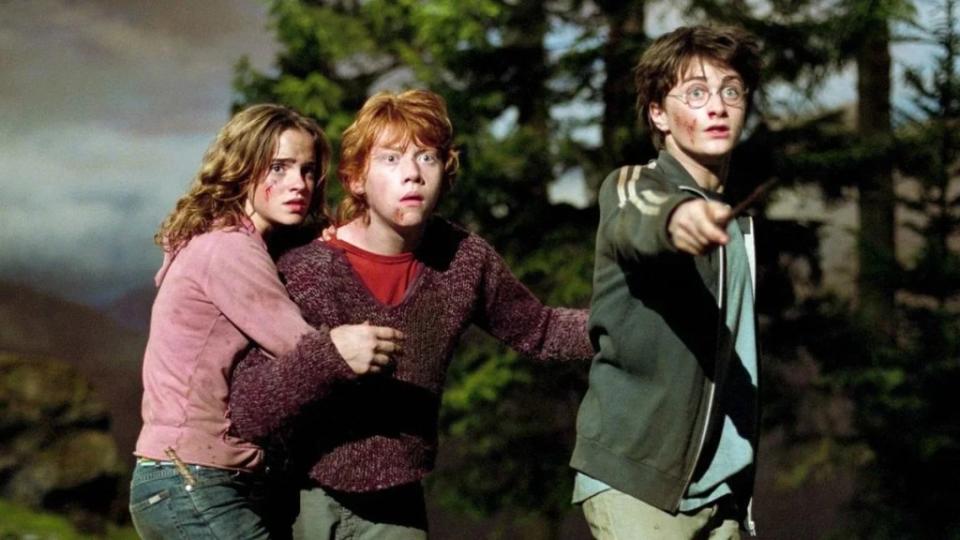Ignore Readers at Your Peril: YA Adaptations Cash In When They Win Over Book Fans | Chart
Nearly a decade after the last “Hunger Games” movie hit theaters, the prequel film “The Ballad of Songbirds and Snakes” debuted on Nov. 17 with a $44 million opening weekend box office haul. Meanwhile, Disney+ is releasing an adaptation of Rick Riordan’s “Percy Jackson & the Olympians” in December, while Max is rebooting “Harry Potter” as an original series.
Seemingly out of nowhere, the young adult fiction adaptations of the 2000s and 2010s are back with a vengeance.
Hollywood spent a good deal of the last few decades producing epic fantasies based on novel series beloved by millennial bookworms, including “Twilight,” “The Maze Runner” and “Divergent.” Now, as their audience grows older, studios are hoping to capture their attention once more by giving them an opportunity to not just relive the stories that defined their childhoods, but to introduce those stories to their kids.
Of course, some of these movies were more successful than others. Looking back on a decade filled with hits (think every single “Harry Potter” movie) and misses (think “Divergent: Allegiant”), are there any lessons that Lionsgate, Warner Bros., and Disney can learn from to ensure their new adaptations are hits? Ranker Insights data suggests one thing is paramount: capturing true fans of the original novels.

We wanted to see how many fans of the biggest young adult novel adaptations were also fans of the books they’re based on. How did we do it? With Ranker Insights, which uses voting data from lists on Ranker, the #1 source of crowdsourced rankings on the internet, to find connections between the preferences that pop culture fans have for movies, books, TV shows, and more.
Ranker Insights uses this data to find “affinities,” which are calculated based on Ranker visitors who have voted on two different items. When enough people vote the same way about both items, they develop an Affinity. The stronger the Affinity Score, the more likely it is that fans of one thing are also fans of the other.
As the graph above shows, the movies that made the most money tended to also have the strongest Affinities with their respective novels. For example, the first four “Hunger Games” movies grossed a total of $2.96 billion, meaning each film earned an average of $740 million. Insights tells us the “Hunger Games” franchise has an Affinity Score of 563 with the “Hunger Games” novels — that means that fans of the movies are roughly six times more likely than the average voter to also be fans of the books.
By contrast, the original “Percy Jackson” franchise ended with a cliffhanger after the second film failed to build momentum from the first. The two movies earned an average of roughly $212 million apiece, and their fans have zero Affinity with the original books. Taken together with the lower Affinity Scores that “The Maze Runner” and “Divergent” franchises had with their respective books, these findings suggest that adaptations fail when studios don’t successfully market to readers of the novels (Riordan himself refused to watch the adaptations of his work).
That isn’t to say that it’s impossible to generate a new and distinct audience of filmgoers. As the third most profitable film franchise in movie history, the first eight “Harry Potter” films brought in an average of over a billion dollars per movie. But the film franchise has a slightly lower Affinity Score with the books than the “Twilight” and “Hunger Games” movies do with their respective novel series. In fact, fans of the “Harry Potter” franchise are slightly more likely to love the first “Hunger Games” book than they are to love the “Harry Potter” book series as a whole. With franchises this popular, you build a momentum that allows you to attract fans who may never actually read the original novels.

Does that mean the coming “Harry Potter” series should ignore fans of the books? Probably not, given the comparative difficulties that the “Fantastic Beasts” films have had compared to their predecessors. “The Ballad of Snakes and Songbirds” isn’t designed to launch a new franchise, so Lionsgate should likely also focus its attention on fans of the original movies and, therefore, the books. Meanwhile, the coming “Percy Jackson” adaptation should attempt to correct the mistakes made by the films by actively courting the readership of the original novels.
In an entertainment business where movie studios find themselves competing for audiences’ attention with other, smaller screens, it’s easy to dismiss the importance of America’s shrinking population of enthusiastic readers. But if there’s one group of bookworms that’s only getting more passionate, it’s young adult fiction fans. The data makes it clear: courting the readers is the key to a successful adaptation.
The post Ignore Readers at Your Peril: YA Adaptations Cash In When They Win Over Book Fans | Chart appeared first on TheWrap.


